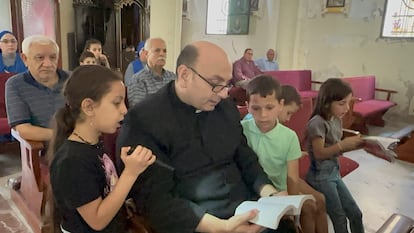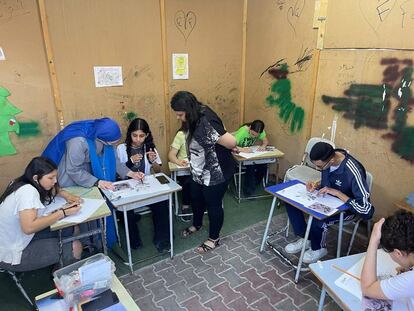The new pope should "keep Gaza in his heart," says the parish priest of the Strip.

Every day at eight o'clock in the evening, the bells of the Holy Family Church in Gaza ring. It was the hour Pope Francis called for for a year and a half. He almost never missed that appointment, even when he was in the hospital, already very weak, at the end of his life. The ringing contrasts starkly with the sordid destruction that reigns in this neighborhood in the heart of the city and brings back memories of normalcy for the community that comforts them, but also distresses them. At that moment, the more than 400 Palestinian Christians who have lived practically barricaded in this place since October 2023 stop what they are doing, pray, and remember the person who somehow protected them for months from death and hunger.
"Some cross themselves, others say, 'Good morning, Holy Father,' which was the greeting Father Youssef, one of the parish priests, gave when the Pope called. There are also people who recall anecdotes from those calls from the Holy Father," the parish priest of Gaza, Argentine priest Gabriel Romanelli, told this newspaper in an interview conducted via text messages and audio via WhatsApp.
On Thursday night, the church bells also rang in Gaza, Romanelli says. For Francis and for the newly elected Leo XIV. “It was a surprise, because few of us knew the current pope. And also a joy. People were happy and asked, 'Will this pope also continue to call us?' Let us pray a lot for the Church and for him. May he truly bring, as he himself said, the peace of Christ to the whole world,” he adds.

Francis's death on April 21 was greeted with fear and anxiety by this small community, which, when the war broke out, decided to take refuge in the church, located in the heart of Gaza City, and not leave. Despite the fact that the vast majority of Gaza's 2.2 million inhabitants had to leave their homes and have been eking out a living in various places over the past few months, such as precarious tents or among the ruins of houses. For more than a year and a half, the Pope and the Latin Patriarchate of Jerusalem, the diocese to which the Gaza parish belongs, have watched over these Christians and interceded for them, although the community, like all Gazans, spends sleepless nights due to nearby bombings, suffers from hunger, and barely ventures outside the religious complex.
"We have prayed a lot for Francis and have been grateful for all the good he has done for this community on a permanent basis . We experienced it as extraordinary that he called us every day, that he encouraged us, that he asked us to take special care of the children, and that he encouraged prayers for peace in Gaza within the Church," Romanelli explains.
The Holy Family is the only Catholic church in the Gaza Strip, where before the war there were exactly 1,017 Christians, 135 of them Catholics and the rest Greek Orthodox. In total, across all the Palestinian territories, the community accounts for less than 2% of the population. In addition to the more than 400 faithful currently sheltering there, there are three priests, including Romanelli, several nuns, and 50 Palestinian Muslims with disabilities, most of them children requiring special care. Another 200 people are sheltering in the neighboring Orthodox Church of St. Porphyrius. Nearly 300 members of the community were able to leave via Egypt thanks to a foreign passport or safe conduct permit in the first months of the war.
"Now we pray to God for Peter's successor . May he keep the entire Holy Land, and Gaza in particular, in his heart," the Argentine priest prays.
Rice garnished with canned beansWe experienced it as something extraordinary that called us every day, that gave us encouragement, that asked us to take special care of children and that encouraged prayers for peace in Gaza within the Church.
Gabriel Romanelli, parish priest of Gaza
For more than two months, no humanitarian aid truck has entered the Gaza Strip, and hunger is becoming extreme. According to the UN , virtually the entire population is suffering from acute food insecurity. "Aid and the lives it saves should never be a bargaining chip," UN Humanitarian Affairs Chief Tom Fletcher recently stressed.
With this total blockade, Israel aims to pressure the Islamist movement Hamas, which rules Gaza, to capitulate, accept the Israeli military occupation of the Strip, and hand over the hostages it has held since October 7, 2023—some 59 people, half of whom are already presumed dead.
At best, Gazan families eat once a day. There is rarely fresh food on their plates, and never meat or fish, unless a living animal, especially chickens, is slaughtered or someone ventures into the polluted sea surrounded by the Israeli army to fish. Most of the crops have been destroyed by bombing or are in inaccessible areas due to Israeli military restrictions. The lack of flour also caused all bakeries to close almost a month ago, and the stockpiles of international organizations are also empty.
In the Strip, people survive thanks to what they were able to stockpile during the two-month ceasefire that Israel unilaterally ended on March 18. The parish reflects what the entire Strip is suffering.
"Thanks to the Pope and the help of the Latin Patriarch of Jerusalem, Cardinal Pierbattista Pizzaballa , we received food during the truce and were able to help tens of thousands of families in this area. That's why I believe there are fewer needs in this part of the city than in other areas where nothing remains," Romanelli describes.
The daily lunch for the parish's Christians has been rice "garnished" with some canned beans. All food is strictly controlled. "What's happening is very serious. If this continues, I don't know what will happen. People are exhausted and very distressed because the news doesn't bode well," the parish priest estimates.
A brave stepThanks to the Pope and the help of the Latin Patriarch of Jerusalem, Cardinal Pierbattista Pizzaballa, we received food during the truce and were able to help tens of thousands of families in this area.
Gabriel Romanelli, parish priest of Gaza
Within the parish, the routines of Mass, prayer, and children's classes continue, as well as the organization of different work groups for cleaning, cooking, and caring for the sick to provide a semblance of normalcy and maintain the dignity and spirit of the refugees as much as possible.

“We try to give the children and young people something sweet that we had reserved for moments like these,” Romanelli explains.
All of Gaza remains without electricity, and the lack of fuel means most generators are unusable. In the parish, they have power thanks to solar panels, which they use to charge cell phone batteries, for example. A rehabilitated well within the compound is also helping them access water.
“We ask you to continue praying for peace, for an end to this war, as Francis wished. May the Israeli hostages be released and substantial humanitarian aid allowed in. This would be a courageous step toward peace, more necessary than ever for both Palestine and Israel,” Romanelli urges.
EL PAÍS





